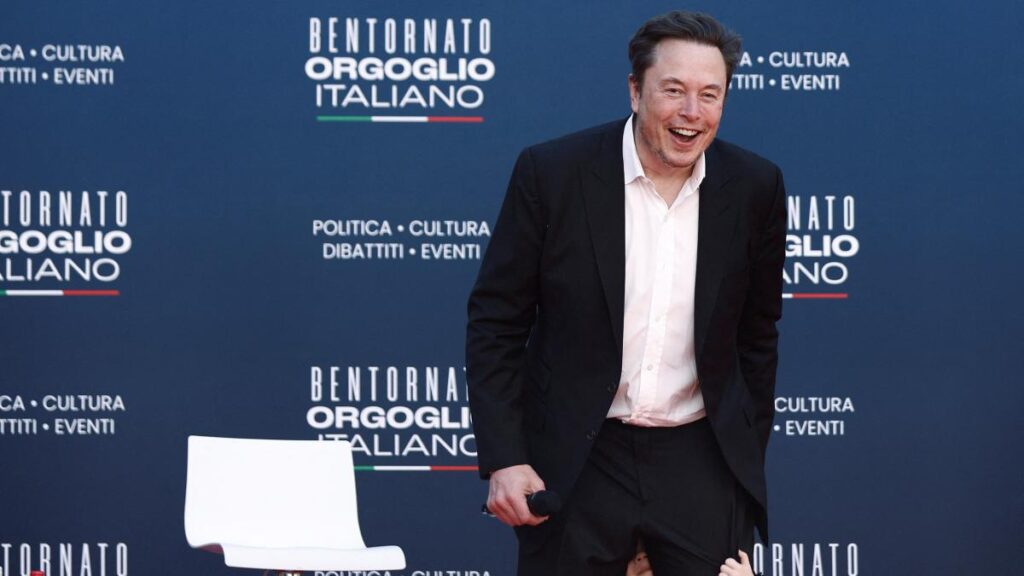Companies controlled by the world’s richest man, Elon Musk, are failing to comply with the most basic information protocols in Spain. The two main companies by volume and influence with which he operates in the country, Tesla Spain and Twitter Spain (a subsidiary of X), have just exceeded the deadlines established by law for filing their accounts with the Mercantile Registry, a rare practice for this type of companies that is also subject to sanctions. Among the sources consulted, some describe the case as “obscurantism” and “lack of transparency.”
Both companies had been recording their accounts year by year up to the financial year 2022. The ones for 2023 should have been approved by the general meeting or the sole shareholder before June 30, 2024, and filed within one month. The regulation states that, after six months from the initial deadline, that is, December 31, the closing of the company’s register can take place and fines can be imposed, which are actually lower considering Musk’s sphere of influence.
The legislation sets penalties, which could be added to those that the CNMV is studying for the social network
This newspaper has contacted both companies seeking an explanation, but has not received a response. Other similar multinational companies with business in Spain, such as Amazon, Apple, Google, and Microsoft, do comply with this practice.
Sources from the Commercial Registry explain that the submission of annual accounts is a requirement for all capital companies, both public limited companies and private limited companies, as well as for limited partnerships (with shares and with reciprocal guarantees), foreign companies with branches in Spain, and pension funds.
Esther Pérez García, director of the commercial and M&A department at Ceca Magán Abogados, points out that when a company has an annual turnover exceeding six million euros, non-compliance can result in a fine of 300,000 euros for each year of delay.
Starting on January 1st, the closing of the registry sheet may proceed, in accordance with Article 282.1 of the Spanish Capital Companies Act, which would prevent Tesla and X subsidiaries from registering movements such as capital increases or statutory modifications.
After Musk’s purchase of Twitter in October 2022 for 44 billion dollars and the dismissal of 80% of its staff in Spain, one option would have been to liquidate the subsidiary. Instead, it remains registered, and in September, it appointed five attorneys, which it did report to the registry. They have also made note of the name change of the parent company.
Failure to comply can result in a penalty of 300,000 euros for each year of delay
This wouldn’t be the first fine that X would face in Spain. Just a few days ago, the CNMV (Spanish National Securities Market Commission) initiated disciplinary proceedings against them for their failure to control fraudulent advertising. The social network already experienced an exodus of major advertisers following Musk’s arrival, and a report by Fidelity estimated last October that it has lost 80% of its value since its acquisition. Operating under Twitter International Company, it reported revenues of 8.5 million in its latest financial year in Spain, 2022.
The Tesla case is more striking because it is the undisputed leader in the sale of electric cars in Spain, according to Anfac data. The Model 3 has a market share of 19%, and the Model Y, 9.5%. Public incentives for purchases are boosting this market.
These vehicles are marketed through Tesla Spain, a subsidiary of the Dutch company Tesla Motors Netherlands. In the most recent year for which the company filed its accounts, 2022, it generated revenue of 240 million euros with a staff of 150 employees, with 51 dedicated to sales and 99 to services.
However, he has not filed the annual accounts again. Instead, he has reported to the registry the dissolution of the company Tesla Spain Holdco, created in 2023 to manage assets, and the appointment of its director in Spain, Rafael Arqueza, as attorney.
Why disappear from the radar?
When a company that has not notified its termination stops publishing accounts, it is usually because it has ceased its activities and does not even bother to communicate it to the registry. This is often the case with smaller companies. It is estimated that around 45% of all registered companies are no longer operational. This does not seem to be the case with Tesla or X.
What could have happened? According to Ceca Magán Abogados, three possible causes are mentioned: accounts may not have been formulated by the management body of the subsidiary, they may not have been approved by the sole shareholder, or the accounts may have been classified as defective without being corrected. A delay in the audit report is another possibility, although this type of subsidiaries does not involve great accounting complexity.
This article was originally published by a www.lavanguardia.com . Read the Original article here. .

